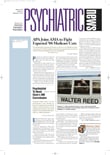Members of the House of Representatives have made yet another effort to solve problems resulting from the high cost of prescription drugs.
In July they voted to provide $12 million to the U.S. Public Health Service to conduct “research on the comparative effectiveness of prescription drugs.”
The funds are part of a health appropriations bill (HR 2660), which will be subject to conference deliberations with members of the Senate later this year.
Rep. Jo Ann Emerson (R-Mo.) led the effort resulting in House passage of the Pharmaceutical Market Access Act of 2003 (HR 2427), which would legalize reimportation of FDA-approved prescription drugs from specified foreign countries (Psychiatric News, August 15). That legislation also is subject to conference deliberations with the Senate.
Tom Allen (D-Maine) and Emerson have cosponsored the Prescription Drug Effectiveness Act of 2003 (HR 2356), which would authorize spending $75 million by the National Institutes of Health and the Agency for Healthcare Research and Quality on studies of the “comparative effectiveness and cost-effectiveness of prescription drugs that account for high levels of expenditures or use by individuals in federally funded health programs.”
On August 23 the New York Times reported that the legislation is supported by Rep. Nancy Johnson (R-Conn.), chair of the House Ways and Means Health Subcommittee. She said that the proposal was “absolutely key to reducing the cost of drugs.”
Organizations supporting the proposal include Rx Health Value (a coalition of employers, patients, and insurers that includes AARP, General Motors, Kaiser Permanente, and the American Academy of Family Physicians), Consumers Union, and Families USA.
The Pharmaceutical Research and Manufacturers of America sent a memorandum to members of Congress opposing the legislation. According to the New York Times, these were among their points:
• The federal studies would almost certainly influence private insurers. “As a result, the government’s cost-based decisions about medical access would be imposed on many patients in both public and private health plans.”
• Cost-effectiveness studies show which drug works best, on average, for large numbers of patients, but the studies often overlook the value of specific medicines for individuals or subgroups, like racial minorities.
• Federal studies could stymie “incremental innovation.”
Psychiatrist Robert Rosenheck, M.D., told Psychiatric News, “There have been a remarkable number of recent studies showing that the source of funds for a study has a strong impact on both its results and recommendations. This effect is particularly true when commercial interests are involved. This initiative could provide less-biased research results. But we should not expect that costs will necessarily go down. The more expensive medications might be more effective. What is important is that value—the health benefit per dollar spent—will go up.” Rosenheck is director of the Department of Veterans Affairs Northeast Program Evaluation Center in West Haven, Conn., and a professor of psychiatry at Yale University.
The bill was referred to the House Committee on Energy and Commerce. ▪
